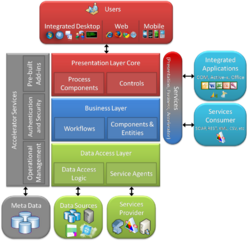Software:Accelerator
The Accelerator is a collection of development solutions for IBM i and Windows platforms using .NET Framework, and/or LANSA, technologies provided by Surround Technologies.[1] The Accelerator development architecture is a tool for building Windows and Web apps within a structured framework.[2]
The intent of the Accelerator solutions is to provide a rapid application development (RAD) environment that produces well-designed n-tier code that can run in a client/server, web or mobile deployment. The use of Microsoft’s .NET Framework, is recommended by Surround for zero-lock in development and optimal deployment flexibility including both Windows Presentation Foundation (WPF) and responsive web (and mobile) design (ASP.NET MVC / Bootstrap) clients.[1]
The Accelerator uses customizable templates, standards and naming conventions to generate code. The generated code is human readable, and standardized to minimize testing, debugging, customization, and future maintenance efforts. The generated code follows object-oriented programming design principles, the inversion of control (IoC) pattern, observer pattern, model–view–viewmodel (MVVM, with OO techniques to avoid redundancy, promote ease of testing and maintenance).[1] Supports ASP.NET MVC3 Framework.[3] Other patterns followed by the architecture, or are adapted depending on the case; flexibility promoted by the typical use of abstraction patterns when practical. Abstraction is promoted through the use of Windows Presentation Foundation and Windows Communication Foundation.
For .NET
The Accelerator's core system architecture provides a base set of functionality and wizard-driven code generation through the implementation of:
- N-tier architecture that encourages reuse patterns includes:
- Data Access Layer (DAL) with multi-threaded data access
- Modular and componentized architecture
- Business entity patterns to enable reuse of logic across all tiers
- Multitasking and multifunctional default user experience
- A very thin user interface to enable reuse of UI logic across multiple UI technologies
- Windows Presentation Foundation (WPF), full use of WPF provides a unified framework for building applications and high-fidelity experiences in Windows that blend application UI, documents, and media content.[4]
- .NET Framework, includes a large library of coded solutions to common programming problems and a virtual machine that manages the execution of programs written specifically for the framework, which can be accomplished with the Accelerator.
- MS Visual Studio, is an integrated development environment (IDE) from Microsoft that assists on the elaboration of software utilizing Accelerator.
- IBM i Systems, advanced user system implementation to enrich your development with web services, multithreaded performance, advanced web technologies and platform independence.
- HTML5 support for ASP.NET
For Visual LANSA
The Accelerator architecture supports service-oriented architecture that includes built-in features like business objects, frameworks, bus interfaces, plug-ins, XML, dashboards, and wizards to simplify deployment.

The Accelerator Business Objects and Services implements a framework that consists of server-side Business Objects, Presentation and Data Service Buses, and Service Adapters. The service-oriented architecture integrates with adapters for XML, SOAP, REST, ActiveX, .NET, XAML/WPF, etc. Because of SOA, BOS functions under IBM i, Windows, LANSA – virtually any server.[5]
References
